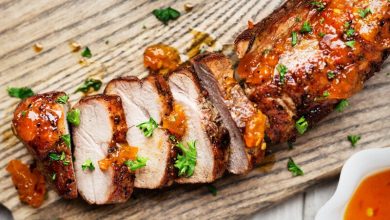🍑🌭 Apricot Sausage Recipe 🍑🌭
History:
The Apricot Sausage is a delightful dish that combines the savory flavors of sausage with the sweetness of apricots. While there isn’t a specific historical account for this recipe, it likely evolved as a fusion of different culinary traditions over time. The combination of sweet and savory flavors is a classic approach in many cuisines.
Components:
To prepare Apricot Sausage, you’ll need the following components:
- Sausages (such as pork or chicken sausages)
- Fresh apricots or apricot preserves
- Olive oil
- Onion (optional)
- Garlic (optional)
- Herbs and spices (like thyme, rosemary, or paprika)
- Salt and pepper
Steps to Prepare Apricot Sausage:
-
Preparation: Start by gathering all your ingredients and equipment. If you’re using fresh apricots, wash and pit them. If using apricot preserves, measure out the desired quantity.
-
Sear the Sausages: Heat a pan over medium-high heat and add a drizzle of olive oil. Once hot, add the sausages and sear them until they’re browned on all sides. This should take about 5-7 minutes. Remove the sausages from the pan and set them aside.
-
Sauté Onions and Garlic (optional): In the same pan, you can sauté finely chopped onions and minced garlic until they turn translucent and fragrant. This step is optional but adds depth of flavor.
-
Apricot Glaze: Add the fresh apricots or apricot preserves to the pan. If you’re using fresh apricots, mash them gently to release their juices. Stir in your choice of herbs and spices (e.g., thyme, rosemary, or paprika) and season with salt and pepper.
-
Combine and Simmer: Return the seared sausages to the pan, coating them with the apricot glaze. Reduce the heat to low, cover the pan, and let it simmer for about 15-20 minutes. This allows the flavors to meld together, and the sausages to cook through.
-
Check for Doneness: Make sure the sausages are cooked through by checking their internal temperature. Pork sausages should reach 160°F (71°C), while chicken sausages should reach 165°F (74°C).
-
Serve: Once the sausages are cooked and the apricot glaze has thickened, you’re ready to serve. Plate the sausages with the apricot glaze spooned over the top.
Estimated Time:
The total time needed to prepare Apricot Sausage may vary depending on your cooking skills and the specific sausages you use. However, on average, you can expect the process to take approximately 30-40 minutes, including prep and cooking time.
This delightful dish combines the rich, savory flavors of sausages with the sweet and slightly tangy notes of apricots. It’s a perfect balance of sweet and savory, making it a unique and delicious addition to your culinary repertoire. Enjoy your Apricot Sausage! 🍑🌭😋
Certainly! Here are some nutrition facts and health information for Apricot Sausage:
Nutrition Facts (Approximate values per serving):
- Calories: 250-350 kcal (depending on sausage type and portion size)
- Protein: 10-15 grams
- Carbohydrates: 15-20 grams
- Dietary Fiber: 2-4 grams
- Sugars: 10-15 grams (mainly from apricots)
- Total Fat: 15-25 grams
- Saturated Fat: 4-7 grams
- Cholesterol: 30-50 milligrams
- Sodium: 500-800 milligrams (varies based on sausages and seasonings)
Health Information:
-
Protein: Sausages provide a good source of protein, which is essential for muscle repair and growth.
-
Carbohydrates: While the carbohydrates in this dish primarily come from apricots, they also provide energy and dietary fiber for digestion.
-
Dietary Fiber: The dietary fiber from apricots and potentially other ingredients helps support digestive health and may aid in feeling full.
-
Sugars: The sugars mainly come from apricots and apricot preserves. While they add sweetness to the dish, it’s important to consume sugary foods in moderation as part of a balanced diet.
-
Total Fat: The fat content can vary depending on the sausages used. While fat is an essential nutrient, it’s advisable to choose lean sausages or enjoy this dish in moderation if you’re concerned about fat intake.
-
Saturated Fat: Be mindful of saturated fat, as excessive consumption can contribute to heart health issues. Choosing leaner sausages or removing excess fat during cooking can help reduce saturated fat content.
-
Cholesterol: Sausages, especially those made from animal products, may contain cholesterol. Limiting dietary cholesterol is recommended for heart health.
-
Sodium: The sodium content can vary greatly depending on the sausages and seasonings used. High sodium intake can contribute to high blood pressure, so be cautious if you’re on a low-sodium diet.
-
Vitamins and Minerals: Sausages may contain essential nutrients like B vitamins (especially B12) and minerals like iron and zinc. However, these levels can vary widely based on the type and quality of sausages.
-
Balance and Moderation: Apricot Sausage can be a flavorful and enjoyable dish when consumed in moderation. It’s a good idea to balance it with plenty of fruits, vegetables, and other whole foods to ensure a well-rounded diet.
Remember that the nutritional content can vary based on the specific ingredients and preparation methods you use, so it’s a good practice to check product labels and consider your dietary needs and preferences when enjoying this dish.



